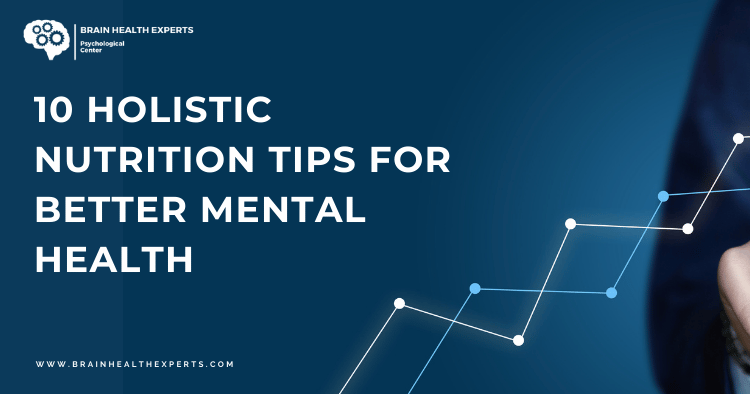Table of Contents
- Introduction
- Understanding the Connection Between Nutrition and Mental Health
- 1. Prioritize Omega-3 Fatty Acids
- 2. Incorporate a Rainbow of Fruits and Vegetables
- 3. Choose Whole Grains Over Refined Grains
- 4. Stay Hydrated
- 5. Limit Processed Foods and Sugars
- 6. Embrace Fermented Foods
- 7. Focus on Balanced Meals
- 8. Mindful Eating Practices
- 9. Consider Supplements Wisely
- 10. Maintain a Consistent Eating Schedule
- Conclusion
- FAQs
Introduction
In recent years, the importance of nutrition in mental health has garnered significant attention. The foods we consume can greatly influence our mood, cognitive function, and overall emotional well-being. This blog post will explore ten holistic nutrition tips that can help improve mental health, based on the latest findings from brain health experts. Let’s dive in!
Understanding the Connection Between Nutrition and Mental Health
Research shows that nutrition plays a crucial role in brain health. Nutrients affect neurotransmitter function, inflammation, and oxidative stress, all of which can impact mood and cognitive function. For instance, a 2024 study published in the Journal of Nutrition highlights the link between dietary patterns and the risk of depression, emphasizing the benefits of a nutrient-rich diet.
Key Nutritional Components for Brain Health
- Vitamins and Minerals: Essential for neurotransmitter synthesis and brain function.
- Antioxidants: Combat oxidative stress, which can lead to brain cell damage.
- Healthy Fats: Support brain structure and function.
1. Prioritize Omega-3 Fatty Acids
Omega-3 fatty acids are vital for brain health. They are found in fatty fish (like salmon and mackerel), walnuts, and flaxseeds. These healthy fats help reduce inflammation and are linked to lower rates of depression and anxiety.
Example:
- Daily Intake: Aim for at least two servings of fatty fish per week or consider a high-quality fish oil supplement.
2. Incorporate a Rainbow of Fruits and Vegetables
Eating a variety of colorful fruits and vegetables ensures you receive a broad range of vitamins, minerals, and antioxidants. Each color represents unique phytonutrients that contribute to mental health.
Examples of Nutrient-Rich Options:
| Color | Fruits & Vegetables | Key Nutrients |
|---|---|---|
| Red | Tomatoes, strawberries | Lycopene, vitamin C |
| Orange | Carrots, sweet potatoes | Beta-carotene, fiber |
| Green | Spinach, kale, avocados | Vitamin K, folate |
| Blue/Purple | Blueberries, eggplant | Anthocyanins, vitamin C |
| Yellow | Bananas, bell peppers | Vitamin C, potassium |
3. Choose Whole Grains Over Refined Grains
Whole grains are rich in fiber and essential nutrients that support gut health, which is closely tied to mental well-being. They help regulate blood sugar levels, preventing mood swings.
Recommended Whole Grains:
- Quinoa
- Brown rice
- Oats
- Barley
4. Stay Hydrated
Dehydration can lead to fatigue and affect cognitive function. Drinking enough water is essential for maintaining energy levels and focus.
Hydration Tips:
- Aim for at least 8 glasses (64 ounces) of water daily.
- Include herbal teas or infused water for variety.
5. Limit Processed Foods and Sugars
Highly processed foods can negatively impact mental health. They often contain additives, unhealthy fats, and excessive sugars that can lead to mood swings and inflammation.
How to Reduce Processed Foods:
- Cook at home using fresh ingredients.
- Read food labels and choose items with fewer ingredients.
6. Embrace Fermented Foods
Fermented foods like yogurt, kefir, and sauerkraut promote gut health by providing probiotics, which can enhance mood and reduce anxiety.
Incorporation Ideas:
- Add yogurt or kefir to smoothies.
- Include fermented vegetables in salads.
7. Focus on Balanced Meals
A balanced meal includes protein, healthy fats, and complex carbohydrates. This combination helps stabilize blood sugar levels and ensures a steady supply of energy to the brain.
Balanced Meal Ideas:
- Grilled chicken with quinoa and steamed broccoli.
- A chickpea salad with olive oil, lemon, and a variety of vegetables.
8. Mindful Eating Practices
Mindful eating encourages awareness of the eating experience, helping you to savor food and recognize hunger cues. This practice can reduce emotional eating and promote a healthier relationship with food.
Mindful Eating Tips:
- Eat slowly and without distractions.
- Pay attention to the flavors and textures of your food.
9. Consider Supplements Wisely
While it’s best to get nutrients from food, some supplements can support mental health. Omega-3, vitamin D, and B vitamins are often recommended, especially for those with dietary restrictions.
Consult a Professional:
- Always consult a healthcare provider before starting any supplements.
10. Maintain a Consistent Eating Schedule
Eating at regular intervals can help regulate mood and energy levels. Skipping meals can lead to irritability and decreased cognitive function.
Schedule Tips:
- Aim for three balanced meals and two healthy snacks per day.
- Plan meals ahead to avoid impulsive eating.
Conclusion
Improving mental health through nutrition is both a science and an art. By incorporating these holistic tips into your daily routine, you can support your brain health and enhance your emotional well-being. Remember, small changes can lead to significant improvements, so start with one or two tips and gradually incorporate more.
FAQs
1. How long does it take to see improvements in mental health with dietary changes?
Improvements can often be noticed within a few weeks to a few months, depending on the individual and the extent of dietary changes.
2. Can nutrition alone improve mental health?
While nutrition plays a crucial role, it is often most effective when combined with other interventions such as therapy and exercise.
3. Are there specific foods to avoid for better mental health?
Yes, it’s best to limit processed foods, sugars, and trans fats, which can negatively impact mood and cognitive function.
For more information on nutrition and mental health, you can visit the National Institute of Mental Health or check out the latest research on brain health at the Harvard T.H. Chan School of Public Health.
By following these holistic nutrition tips, you can take proactive steps towards better mental health. Your brain deserves the best fuel for optimal functioning, and a colorful, nutritious diet is one of the most effective ways to achieve that!





